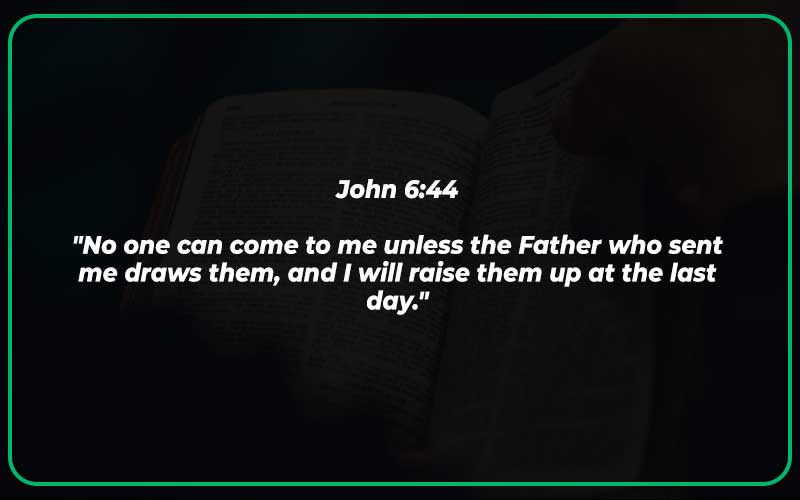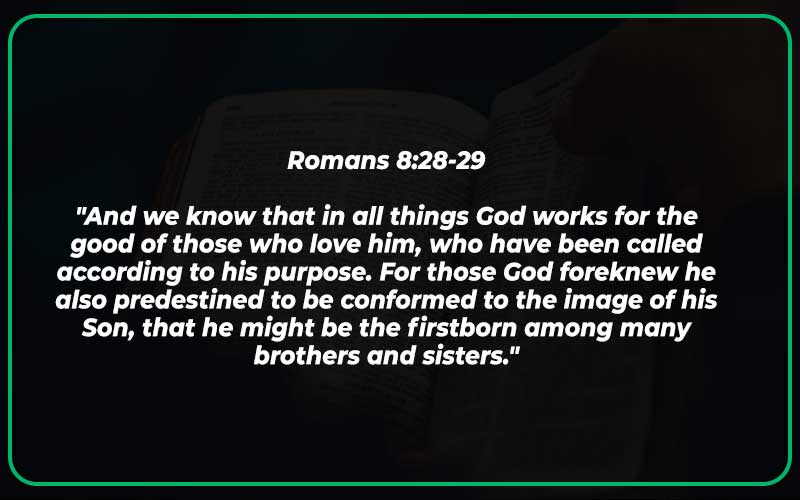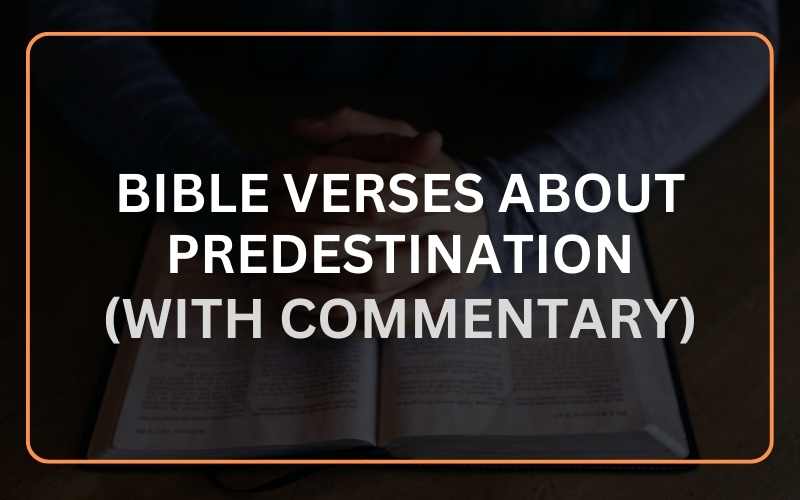The concept of predestination has been a topic of theological debate and discussion for centuries. In this blog post, we will explore Bible verses about predestination and delve into the biblical understanding of God’s sovereignty and human free will.
Join us as we unpack the Scriptures and gain a deeper understanding of this complex doctrine, discovering how it can shape our understanding of God’s plan for our lives and our responsibility to respond to His grace.
Get ready to embark on a journey of exploration and contemplation as we seek to comprehend the mysterious ways of God’s divine purposes.
Also Read: Bible Verses About Foolishness
Bible Verses About Predestination
Ephesians 1:11
“In him we were also chosen, having been predestined according to the plan of him who works out everything in conformity with the purpose of his will.”
This verse teaches us that believers were predestined by God according to His divine plan, which includes everything that happens in the world. It emphasizes that everything is under God’s control and that our salvation is part of His purpose and plan.
Romans 8:29-30
“For those God foreknew he also predestined to be conformed to the image of his Son, that he might be the firstborn among many brothers and sisters. And those he predestined, he also called; those he called, he also justified; those he justified, he also glorified.”
Here, Paul explains that God’s predestination is based on His foreknowledge of believers and His desire that they become like Christ. This verse shows that predestination is connected to the process of salvation. Those whom God predestined, He also called, justified, and glorified.
Romans 9:18
“Therefore God has mercy on whom he wants to have mercy, and he hardens whom he wants to harden.”
This verse emphasizes that God has the authority to have mercy on whom He chooses and to harden whom He chooses. It speaks to the sovereignty of God in the process of salvation and suggests that predestination is a part of His divine plan.
Acts 13:48
“When the Gentiles heard this, they were glad and honored the word of the Lord; and all who were appointed for eternal life believed.”
Here, it is stated that those who believed were appointed for eternal life. This verse suggests that salvation is predetermined by God and that those whom God has appointed for eternal life will respond to the gospel with belief.
1 Peter 1:2
“who have been chosen according to the foreknowledge of God the Father, through the sanctifying work of the Spirit, to be obedient to Jesus Christ and sprinkled with his blood: Grace and peace be yours in abundance.”
This verse indicates that believers have been chosen by God according to His foreknowledge. The process of sanctification and obedience to Christ is also part of this predestination. It highlights that believers are saved by God’s grace through faith in Jesus Christ.
John 6:44
“No one can come to me unless the Father who sent me draws them, and I will raise them up at the last day.”
This verse emphasizes the role of God in drawing people to Jesus Christ. It implies that those whom He draws will be raised up at the last day, signifying that predestination is a part of God’s plan for salvation.

Romans 11:7
“What then? What the people of Israel sought so earnestly they did not obtain. The elect among them did, but the others were hardened,”
This verse speaks about the concept of election, emphasizing that it is only the elect who obtain what they desire. Here, it is implied that some people are hardened to the gospel and do not respond to it. This verse highlights that being chosen by God is an act of grace and privilege.
2 Timothy 1:9
“He has saved us and called us to a holy life—not because of anything we have done but because of his own purpose and grace. This grace was given us in Christ Jesus before the beginning of time.”
Here, it is stated that believers are saved and called to a holy life according to God’s purpose and grace. The implication is that predestination is part of God’s plan for salvation, emphasizing that it is not anything believers have done, but it is an act of God.
Revelation 13:8
“All inhabitants of the earth will worship the beast—all whose names have not been written in the Lamb’s book of life, the Lamb who was slain from the creation of the world.”
Here, it is mentioned that the Lamb was slain from the creation of the world, emphasizing that salvation is part of God’s plan. It is further implied that only those whose names are written in the Lamb’s book of life will be saved, signifying the importance of being predestined by God.
Ephesians 2:8-9
“For it is by grace you have been saved, through faith—and this is not from yourselves, it is the gift of God—not by works, so that no one can boast.”
This verse highlights that salvation is a gift of God, received by grace through faith in Jesus. It emphasizes that we cannot earn salvation by our works, suggesting that predestination is based on God’s grace.
John 10:26-27
“But you do not believe because you are not my sheep. My sheep listen to my voice; I know them, and they follow me.”
This verse implies that those who are Jesus’ sheep will hear and follow His voice. It suggests that there is a distinction between believers and non-believers, emphasizing the work of God in predestining those who will respond to His call.
Romans 8:33
“Who will bring any charge against those whom God has chosen? It is God who justifies.”
Here, it is stated that God justifies those whom He has chosen. This verse highlights the sovereignty of God in the process of salvation, emphasizing that those whom God has chosen are declared righteous and cannot be condemned by anyone.
John 15:16
“You did not choose me, but I chose you and appointed you so that you might go and bear fruit—fruit that will last—and so that whatever you ask in my name the Father will give you.”
Here, Jesus states that it is He who chooses and appoints believers to go and bear fruit. This verse emphasizes the work of God in predestining believers to fulfill His purpose, highlighting that prayer is a result of predestination.
Romans 9:22-23
“What if God, although choosing to show his wrath and make his power known, bore with great patience the objects of his wrath—prepared for destruction? What if he did this to make the riches of his glory known to the objects of his mercy, whom he prepared in advance for glory?”
This verse teaches that God has the freedom to choose whom He wills, showing mercy to whom He desires. It emphasizes that God’s plan involves those prepared in advance for glory, highlighting that predestination is part of God’s divine plan.
2 Thessalonians 2:13-14
“But we ought always to thank God for you, brothers and sisters loved by the Lord, because God chose you as firstfruits to be saved through the sanctifying work of the Spirit and through belief in the truth. He called you to this through our gospel, that you might share in the glory of our Lord Jesus Christ.”
This verse emphasizes that God chose believers for salvation through the sanctifying work of the Spirit and belief in the truth. It highlights the work of God in predestination and emphasizes that salvation is a result of being called by God through the gospel of Jesus Christ.
Acts 2:23
“This man was handed over to you by God’s deliberate plan and foreknowledge; and you, with the help of wicked men, put him to death by nailing him to the cross.”
Here, it is stated that Jesus was handed over by God’s deliberate plan and foreknowledge. This verse emphasizes that everything was under God’s control, including the death of Jesus, reinforcing the concept of predestination.
Romans 8:28-29
“And we know that in all things God works for the good of those who love him, who have been called according to his purpose. For those God foreknew he also predestined to be conformed to the image of his Son, that he might be the firstborn among many brothers and sisters.”
Here, it is mentioned that those whom God foreknew were predestined to be conformed to the image of His Son, Jesus Christ. This verse emphasizes that predestination is part of God’s plan for believers and that everything God does is for the good of those who love Him.

What does the Bible say about predestination?
The concept of predestination is a theological doctrine that has been widely discussed and debated throughout Christian history. It refers to the belief that God has foreordained certain events or destinies for individuals or groups before the creation of the world. The idea of predestination is mentioned in various passages in the Bible, primarily in the New Testament, and has been interpreted differently by different Christian denominations. In this essay, we will explore the biblical references to predestination and the different theological perspectives surrounding this doctrine.
Biblical References to Predestination
The doctrine of predestination finds its scriptural basis in several key passages in the Bible. One of the most prominent and frequently cited verses is found in the New Testament in the book of Romans:
Romans 8:28-30 (ESV):
“And we know that for those who love God all things work together for good, for those who are called according to his purpose. For those whom he foreknew, he also predestined to be conformed to the image of his Son, in order that he might be the firstborn among many brothers. And those whom he predestined, he also called, and those whom he called he also justified, and those whom he justified he also glorified.”
This passage from Romans speaks about God’s predetermined plan for those who love Him and are called according to His purpose. It suggests that those whom God foreknew (had prior knowledge of) were predestined to be conformed to the image of His Son, Jesus Christ. This conformity to Christ’s image culminates in glorification, indicating an eternal destiny in the presence of God.
Another significant passage is found in the book of Ephesians:
Ephesians 1:4-5 (ESV):
“Even as he chose us in him before the foundation of the world, that we should be holy and blameless before him. In love, he predestined us for adoption to himself as sons through Jesus Christ, according to the purpose of his will.”
This verse emphasizes God’s act of choosing believers in Christ before the world’s creation and predestining them for adoption as His children through Jesus Christ. It highlights that predestination is an expression of God’s will and is rooted in His love.
Interpretations of Predestination
Throughout Christian history, different theological perspectives have emerged concerning the concept of predestination. The two primary viewpoints are known as Calvinism and Arminianism.
Calvinism
Calvinism, named after the Protestant reformer John Calvin, advocates a robust belief in predestination. It is a major theological system within Protestant Christianity. According to Calvinism, God’s choice of those who will be saved is unconditional and not based on any foreseen merit or action on the part of individuals. This is often summarized using the acronym TULIP:
- Total Depravity: Humanity is inherently sinful and incapable of choosing God on its own.
- Unconditional Election: God chooses certain individuals for salvation solely based on His sovereign will, not because of anything they have done.
- Limited Atonement: Christ’s sacrificial death on the cross is intended only for the elect, not for all of humanity.
- Irresistible Grace: Those whom God has predestined for salvation cannot resist His calling.
- Perseverance of the Saints: The elect will persevere in their faith and cannot lose their salvation.
Calvinists believe that predestination is an essential aspect of God’s sovereignty and that it highlights His grace and mercy in choosing to save sinners.
Arminianism
Arminianism, named after the Dutch theologian Jacobus Arminius, takes a different stance on predestination. Arminians believe in God’s foreknowledge of human choices and argue that predestination is based on God’s knowledge of who will freely choose to accept or reject Him. This viewpoint is often summarized by the acronym FACTS:
- Freed will: Human beings have free will and can choose to accept or reject God’s offer of salvation.
- Atonement for All: Christ’s atonement is available to all people, and its benefits can be accessed through faith.
- Conditional Election: God’s predestination is based on His foreknowledge of who will choose to believe in Him.
- Total Depravity: Similar to Calvinism, Arminians believe in the sinful nature of humanity.
- Security in Christ: While believers are secure in their salvation, they can choose to reject God’s grace and lose their salvation.
Arminians emphasize the importance of human responsibility and argue that God’s predestination is consistent with His loving desire for all people to be saved.
Understanding the tension
The debate between Calvinism and Arminianism over predestination has been a longstanding theological discussion, and it often centers on the balance between God’s sovereignty and human responsibility. The tension arises from questions such as, “If God predestines some to salvation, does that mean He also predestines others to damnation?” and “How can God’s sovereignty and human free will coexist?”
It is essential to recognize that both perspectives seek to understand and interpret the same biblical texts that reference predestination. However, they arrive at different conclusions based on their theological frameworks.
Diverse Views within Christianity
In addition to Calvinism and Arminianism, there are various nuanced perspectives on predestination held by different Christian traditions:
Molinism
Molinism, named after the Jesuit theologian Luis de Molina, attempts to reconcile God’s sovereignty and human free will by introducing the concept of middle knowledge. According to Molinism, God possesses knowledge of what individuals would freely choose under any given circumstance. God uses this middle knowledge to actualize a world where His purposes are fulfilled, and individuals make free choices in alignment with His will.
Universalism
Universalism holds that God’s ultimate plan is to save all people, and everyone will eventually be reconciled to Him. While predestination is acknowledged, it is seen as leading to the eventual salvation of all individuals.
Open Theism
Open Theism challenges the classical view of God’s omniscience, arguing that God has granted humans genuine free will, and future events are not entirely known to Him. In this perspective, predestination takes on a more limited role, as it is influenced by human choices and actions.
Catholic Perspective
The Catholic Church holds a multifaceted view on predestination, acknowledging that God’s grace plays a central role in salvation. While some elements of predestination align with Calvinism, the Catholic Church emphasizes the cooperation of human free will with God’s grace in the process of salvation.
Conclusion
The concept of predestination is a theologically rich and complex topic within Christianity. Biblical references to predestination, particularly in passages like Romans 8:28-30 and Ephesians 1:4-5, have inspired diverse interpretations and theological systems throughout Christian history.
Calvinism emphasizes God’s sovereignty and unconditional election of the elect, viewing predestination as an essential aspect of God’s grace and mercy. Arminianism, on the other hand, highlights the importance of human free will and God’s foreknowledge, suggesting that predestination is based on God’s knowledge of human choices.
Beyond Calvinism and Arminianism, various other theological perspectives have emerged, seeking to reconcile God’s sovereignty with human responsibility, such as Molinism, Universalism, Open Theism, and the Catholic view.
In the end, while Christians may hold different theological positions on predestination, it is crucial to engage in respectful dialogue and to seek a deeper understanding of God’s Word. Regardless of one’s perspective on predestination, the overarching message of the Bible remains clear: God’s love, grace, and offer of salvation through Jesus Christ are available to all who believe and put their trust in Him.

